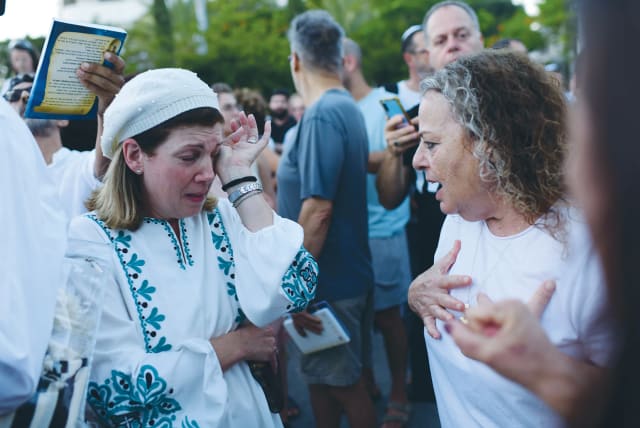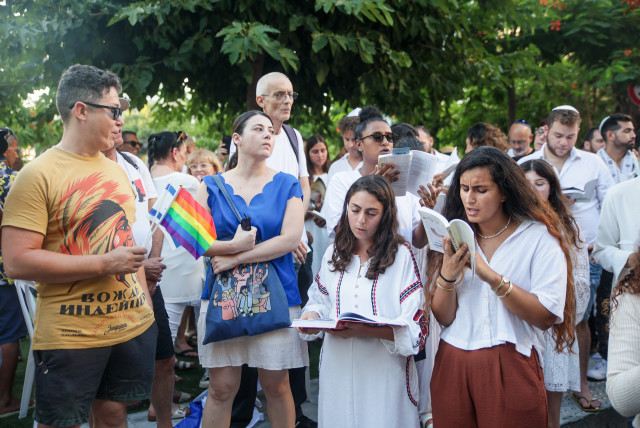When solidarity was lost on the most important day of the Jewish year - opinion

The hurt felt by the broad section of the Israeli public that is moderately traditional may have serious consequences for the struggle against the government’s judicial overhaul.
The events of this year’s Yom Kippur have evoked harsh feelings, even among the moderate wing of religious Zionism (dati leumi aka National-Religious) in Israel. The hurt felt by the broad section of the Israeli public that is moderately traditional may have serious consequences for the struggle against the government’s judicial overhaul.
If this struggle does degenerate into an all-out culture war, then these groups will be forced to make a tragic choice between their democratic values and their religious identity, which will jeopardize the success of the struggle as a whole.
Like many others in the religious Zionist community, I identify with and am an active participant in the liberal struggle against the government’s judicial overhaul program. We have no desire to live in a state in which the liberal-secular public does not want to live.
We have no particular sympathies for the Rosh Yehudi organization or for those religious settlement groups that operate in mainly secular cities.
We think it is a good thing that the liberal public in Israel has awoken, and that certain principles – such as gender equality – are being given the attention they deserve.
Moderation in religious Zionist
These views are being shared by more and more people, and there is a growing shift toward moderation among the religious Zionist public. Regarding the judicial overhaul, it may even be the case that the mainstream of religious Zionism is closer to the religious-Zionist-democratic activist group than to the views held by Finance Minister Bezalel Smotrich, who they think has illegitimately coopted the “religious Zionism” brand. However, the events of Yom Kippur have evoked harsh feelings even among this same moderate group within religious Zionism.
First, interrupting Yom Kippur prayers, whether with outright violence or with near violence, touches some very sensitive nerves. No other event in the Jewish year occupies such a central place in the Jewish soul as Yom Kippur prayers. And nothing evokes such fears and complex feelings, deeply rooted in the experiences of Jewish history, as the interruption of Yom Kippur prayers. These fears were only amplified 50 years ago when Israelis were called from the synagogues with the outbreak of the most terrible of Israel’s wars.
Second, the responses from the liberal side have classed all prayers in public spaces – and separation between men and women – as belonging to a single category. But these responses fail to distinguish between extremist groups aiming to provoke a reaction and Yom Kippur prayer groups, such as those held each year by the Tzohar organization, which make limited use of public space and time, and those that are arranged by moderate organizations with no malicious intent.
The hurt felt by moderate religious Zionists, and I think also by large sections of the moderate traditional public in Israel, could have serious consequences for the struggle against the judicial overhaul. If this struggle degenerates into an all-out culture war, then these groups will be forced to make a tragic choice between their attitude toward democracy and their religious identity.
Such a choice would jeopardize the success of the entire protest movement, which in purely numerical terms is very much dependent on an ability to maintain a coalition between the liberal secular public, on the one hand, and on the other, the moderate religious Zionist and traditional publics who oppose the direction in which Israel is being led by the proponents of the judicial overhaul.
Could things have been handled differently? I believe that both sides in this year’s Yom Kippur conflict drifted much too quickly into aggressive and confrontational discourse that pitted different public rights against one another in a zero-sum game in which there can only be winners and losers.
This day, the most important in the Jewish calendar, which 50 years ago also became the most traumatic day in Israeli history, should be left as a small, protected reserve of civil solidarity, without either winners or losers.
The writer is a senior fellow at the Israel Democracy Institute and a member of the Faculty of Law at the Ono Academic College.
Jerusalem Post Store
`; document.getElementById("linkPremium").innerHTML = cont; var divWithLink = document.getElementById("premium-link"); if (divWithLink !== null && divWithLink !== 'undefined') { divWithLink.style.border = "solid 1px #cb0f3e"; divWithLink.style.textAlign = "center"; divWithLink.style.marginBottom = "15px"; divWithLink.style.marginTop = "15px"; divWithLink.style.width = "100%"; divWithLink.style.backgroundColor = "#122952"; divWithLink.style.color = "#ffffff"; divWithLink.style.lineHeight = "1.5"; } } (function (v, i) { });

